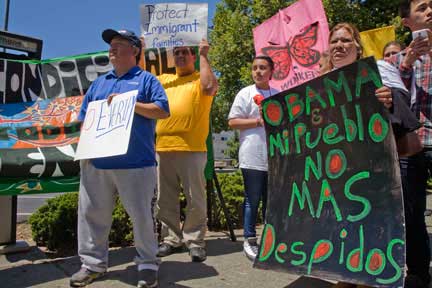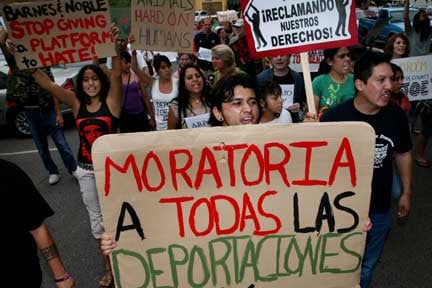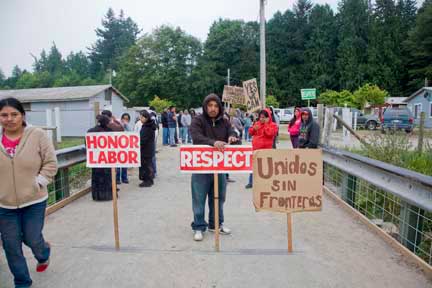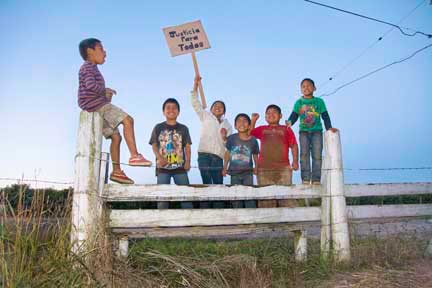
This fall, when Congress couldn’t pass immigration reform bills – even ones deeply unpopular among many immigrants themselves – one of the most important responses came from Oaxaca. In the capital of this southern Mexican state, a representative of a Silicon Valley union sat down with a state agency and an organization of indigenous migrants and signed an agreement for mutual cooperation.
All three groups pledged to work to protect the rights of Oaxacans who have migrated to the US. About 800,000 live in California alone. “Our objective,” the agreement reads, “is the protection of the human and labor rights of Oaxacan workers and their families, in the food and commercial industries.” It lists shared commitments, including explaining to immigrant workers their labor rights in the United States, helping them file claims when they’re hurt at work and advocating for them when they face government agencies.
According to Gerardo Dominguez, organizing director for the union involved, Local 5 of the United Food and Commercial Workers, “We have a state government in Oaxaca that’s willing to do something beyond its borders to help its people who now live here. Our relationship can grow in ways that will help our union and give these workers much more power over their own lives.” The agreement was signed also by Rufino Dominguez, director of the Oaxacan Institute for Attention to Migrants (IOAM), and Bernardo Ramirez, the binational coordinator of the Binational Front of Indigenous Organizations (FIOB).
The need for an agreement like this was dramatized this year by the debate over the “comprehensive immigration reform” bills in Congress. While one of them, passed by the Senate in June, SB 744, does contains some protections for immigrant workers trying to organize unions, it also contains vastly increased enforcement measures that would lead to the firing and deportation of thousands of undocumented people. Even harsher bills in the House of Representatives contain stricter enforcement terms with no worker protections at all.
Local 5 has been a vocal critic of those measures, particularly the provision that would require all employers to use the government’s E-Verify system to identify, and then fire, workers without legal immigration status. The union fought a three-year battle to organize workers at the Mi Pueblo supermarket chain, and during that campaign the company fired hundreds of workers because they were undocumented. Mi Pueblo publicly announced it was using the E-Verify database to identify them, a move the union said was intended to frighten and intimidate employees so they wouldn’t organize.
The agreement between Local 5, the IOAM and the FIOB was one of a growing number of actions in fall 2013 by immigrant communities and immigrant rights groups, responding to Congressional inaction, as well as to many anti-immigrant provisions of Congress’ bills. There is a growing interest in using direct action to defend immigrants in their workplaces and communities, and building a stronger grass-roots movement for more progressive immigration reform proposals.
Almost all community-based immigrant rights organizations outside of Washington, DC, are seeking ways to stop the federal government’s huge wave of deportations. Last year 409,849 people were deported from the United States, and the total for President Obama’s first five years is about to reach 2 million. According to the Immigration and Customs Enforcement (ICE) Agency of the Department of Homeland Security, current deportations average 30,791 per month, including more than 8,500 parents of US citizen children. The federal government spends more today on border and immigration enforcement than on all other law enforcement agencies combined – $18 billion last year alone.
Enforcement includes firings as well as deportations. In each of the past five years, ICE has audited the records of more than 2,000 employers, ordering them to fire undocumented workers. The mass firings include thousands of janitors and sewing machine operators, as well as workers in farms, factories and meatpacking plants.
 Union and immigrant rights activists demonstrate against E-Verify and firings at Mi Pueblo markets – their sign says “Obama and Mi Pueblo — No More Firings.” (Photo: David Bacon)While firings of those without papers increase, so do the numbers of workers brought to the United States by employers with visas that tie their ability to stay to their jobs – “guest workers.” A recent report, Visas Inc., documents mushrooming use of temporary migrant labor. Between 700,000 and 900,000 migrants on temporary work visas are working in the United States at any given time. The most notorious of these visa programs, H2A and H2B, are called “close to slavery“ by the Southern Poverty Law Center, which documented extensive abuse of worker rights.
Union and immigrant rights activists demonstrate against E-Verify and firings at Mi Pueblo markets – their sign says “Obama and Mi Pueblo — No More Firings.” (Photo: David Bacon)While firings of those without papers increase, so do the numbers of workers brought to the United States by employers with visas that tie their ability to stay to their jobs – “guest workers.” A recent report, Visas Inc., documents mushrooming use of temporary migrant labor. Between 700,000 and 900,000 migrants on temporary work visas are working in the United States at any given time. The most notorious of these visa programs, H2A and H2B, are called “close to slavery“ by the Southern Poverty Law Center, which documented extensive abuse of worker rights.
All of these anti-immigrant measures have been implemented in the absence of any legislation passing through a virtually paralyzed Congress. And because the administration doesn’t need Congressional action to ramp up enforcement and guest worker programs, activists argue, it doesn’t need it to end them either, or at least to scale them back. They point to the achievement by young undocumented immigrants of “deferred action” – an executive order issued last year by the administration, which halted the deportation of young people (the “dreamers”) brought to the US as children without papers.
Advocates of the Congressional immigration bills called for demonstrations nationally on October 5, 2013, to demand that the House of Representatives vote on a reform bill. Many communities did organize actions, but they often were critical of what Congress was proposing, especially of the administration’s deportation wave.
In Omaha, the Heartland Workers’ Center meticulously organized a march of 2,000 people. But, it cautioned, “today’s current debate to reform US immigration policies is heavily inundated with discussions to increase enforcement at the southern border, make E-verify mandatory and provide enough workers for US companies. Yet what is often lost is the human side; there are still more than 11 million human beings who remain in immigration limbo because Congress has refused to update the US immigration system and incorporate their humanity into the actual policy debate.”
Gabriella Cardenas, a center board member, condemned “the humanitarian crisis within immigrant communities resulting from the systematic detention, imprisonment and deportation of our fellow human beings.” And the center’s director, Sergio Sosa, warned that just one march would not change things. “Without any question,” he said, “as a demonstration of his political will, [Obama] should start with an executive order (like that for deferred action for “dreamers”) for a “cease fire” – an immediate halt to the deportations.”
Well-connected Washington organizations backing the comprehensive immigration reform bills, however, not only misread this cresting anger but poured gasoline on the fire by criticizing those calling for a moratorium on deportations. Henry Cisneros, former mayor of San Antonio and Clinton Cabinet member, said the moratorium calls would make it harder to get “comprehensive immigration reform” bills passed “because the waters will be so poisoned politically.”
Cisneros was speaking for the Bipartisan Policy Center’s immigration task force, which includes former President George Bush’s secretary of state, Condoleezza Rice; Haley Barbour, former Mississippi governor and Republican powerhouse; and Ed Rendell, former Democratic governor of Pennsylvania. A task force statement said a moratorium would “undermine trust” that the government was seriously committed to “the implementation of stronger border security measures and workplace screening of undocumented individuals.”
 Tucson activists call for a moratorium on deportations. (Photo: David Bacon)The putdown was hardly surprising. In August, after the Senate passed SB 744, the task force hailed the bill and outlined its basic requirements for any reform. They include “a robust worker visa program … essential to the U.S. economy.” Contract workers brought to the United States by employers and who are unemployed longer than 60 days should be deported, it urges. It also calls for heavier border and workplace enforcement, as a question of “national security.”
Tucson activists call for a moratorium on deportations. (Photo: David Bacon)The putdown was hardly surprising. In August, after the Senate passed SB 744, the task force hailed the bill and outlined its basic requirements for any reform. They include “a robust worker visa program … essential to the U.S. economy.” Contract workers brought to the United States by employers and who are unemployed longer than 60 days should be deported, it urges. It also calls for heavier border and workplace enforcement, as a question of “national security.”
The fault lines dividing the Democratic and Republican lobbyists in Washington, and grass-roots organizations in immigrant communities, have grown deeper, not just because of the call for stopping deportations. Political heavyweights and local activists are moving in opposite directions. Their visions of the kind of changes needed in immigration law are fundamentally different.
This became obvious October 8, 2013, in Tucson, Arizona, just three days after the national demonstrations. That evening the Tucson police, implementing the hated immigrant and racial profiling law SB 1070, stopped a car in the middle of the Mexican and Chicano barrio at 10th Avenue and 22nd Street. The vehicle, apparently, had a faulty license plate light.
The stop occurred, however, right outside the Southside Workers Center and the Southside Presbyterian Church. Both have accused the police and the Border Patrol of acting like an occupying army in Latino communities – as though normal civil rights no longer exist in immigrant and working-class neighborhoods. Activists began arguing with police over the detention of the car’s riders, knowing that if they were taken into custody they’d be held for deportation, regardless of the reason for the stop.
The police called the Border Patrol, and the people in the car indeed were detained. But the bystanders then surrounded the car to stop the impending deportation. Forty Border Patrol agents and even more police then set at them with pepper spray, rubber bullets and dogs. Eventually the detained riders were taken away. One protester was arrested, and three were held for a while by ICE agents before they eventually were released.
The Coalicion de Derechos Humanos, a long-established immigrant rights organization in Tucson, declared afterward that “years of continued police and ICE collaboration exacerbated by hateful laws such as SB 1070 have turned this region into a battleground, Our community will not be silent.” Earlier the Coalicion, the Southside Workers Center and 13 other Tucson groups had called for defeat of SB 744, arguing that enforcement already had created a “Constitution-free zone” in Arizona, and that the buildup “is directly responsible for the more than 2,500 men, women and children who have died in the Arizona desert [trying to cross the border.]”
But trying to stop the deportation was more than just a momentary and spontaneous tactic. “This is how we’re going to build a movement that can force Congress to consider a progressive reform,” explained Isabel Garcia, Coalicion director.
Direct action against deportations and enforcement is spreading. The National Day Labor Organizing Network organized an October sit-in in Phoenix. “We want the president to suspend deportations whholesale,” said Chris Newman, the network’s legal director.
And October 17, dozens of young immigrants sat down in front of a bus carrying deportees from the San Francisco ICE office. The protest was organized by Asian Students Promoting Immigrant Rights through Education (ASPIRE), the Asian Law Caucus and a network of other local immigrant rights groups.
One ASPIRE student, Dean Santos, told the media that he had been a prisoner in an immigrant detention facility in Arizona. “I’ve been in that bus before,” he said, “and I remember how powerless I felt. Now, I’m coming back with the power of our communities in our effort to stop the separation of families.”
 Reylla Denis Ferraz Da Silva, her husband Fabricio, and baby Enzo Gabriel. Reylla was picked up for deportation in San Francisco, and was released as a result of community protest. (Photo: David Bacon)In addition to objecting to increased enforcement, immigrant community activists also have questioned the drive toward contract labor programs, like those strongly supported by the Bipartisan Policy Center, and which are major elements of Congress’ reform bills. Like deportations, this too has become a policy question not just debated in Washington but fought out on the ground. In this case, the fight is taking place in the fields of Sakuma Berry Farms, one of the largest strawberry, blueberry and blackberry growers in Washington state.
Reylla Denis Ferraz Da Silva, her husband Fabricio, and baby Enzo Gabriel. Reylla was picked up for deportation in San Francisco, and was released as a result of community protest. (Photo: David Bacon)In addition to objecting to increased enforcement, immigrant community activists also have questioned the drive toward contract labor programs, like those strongly supported by the Bipartisan Policy Center, and which are major elements of Congress’ reform bills. Like deportations, this too has become a policy question not just debated in Washington but fought out on the ground. In this case, the fight is taking place in the fields of Sakuma Berry Farms, one of the largest strawberry, blueberry and blackberry growers in Washington state.
In July more than 250 workers went on strike over low pay and bad conditions in the labor camp where they were living. The workers are indigenous immigrants from Oaxaca, speaking pre-conquest languages like Mixteco and Triqui. Some live in the valley where the farm is, north of Seattle, but most come up every year from Madera and Santa Maria in California.
One migrant explained, “I’m 25 years old, but my body feels much older. How will I take care of my children when they are older and my body is broken down? I’ve been coming here to pick berries since I was 14. This company has taken my youth, and it will take my children’s youth.“
Workers organized a union, Familias Unidas por la Justicia. “Every year that we have been coming to Sakuma Farms we have tried to ask for better wages, housing and treatment from the Sakuma family,” they said in a statement explaining the reasons for their strike. “After years of trying to change the conditions, we felt it was necessary to organize.” The company hired security guards to frighten people in the camp then fired Ramon Torres, the elected leader of the union.
The workers discovered, however, that Sakuma had contracted this year for 160 guest workers under the H2A work visa program. They were brought from Mexico by the Washington Farm Labor Association, a big labor contractor. Then Sakuma told strikers he wouldn’t pay them any more than he was paying the H2A workers. Sometimes he even offered them less. The strikers fear that when they return next year, guest workers will have been brought in to do their work.
The indigenous union members say company foremen threaten to send the H2A workers back to Mexico if they can’t meet high production quotas. “They are isolated under guard, and prohibited from talking to our committee and any other workers. And they are afraid,” the union says.
According to a report by Farmworker Justice, a farm labor advocacy group in Washington DC, “Guest worker programs drive down wages and working conditions of U.S. workers and deprive foreign workers of economic bargaining power.“ SB 744 would replace the H2A program with an even larger guest worker program. The maximum number of visas available to growers in the first five years would reach 337,000.
 Sakuma Farms strikers at the entrance to the labor camp. (Photo: David Bacon)But here again the administration has been able to act without waiting for Congress. A decade ago there were no H2A workers in Washington state. Last year the US Department of Labor certified applications for 7,086 workers, more than double the 3,194 of the previous year, making the state the third-highest nationally, after North Carolina and Georgia. The nation’s second-largest contractor for those workers was the Washington Farm Labor Association, with 2,293 workers – the contractor used by Sakuma Berry Farms. In 2012, the Department of Labor certified 85,248 H2A visas, and the number is rising.
Sakuma Farms strikers at the entrance to the labor camp. (Photo: David Bacon)But here again the administration has been able to act without waiting for Congress. A decade ago there were no H2A workers in Washington state. Last year the US Department of Labor certified applications for 7,086 workers, more than double the 3,194 of the previous year, making the state the third-highest nationally, after North Carolina and Georgia. The nation’s second-largest contractor for those workers was the Washington Farm Labor Association, with 2,293 workers – the contractor used by Sakuma Berry Farms. In 2012, the Department of Labor certified 85,248 H2A visas, and the number is rising.
Bernardo Ramirez, the FIOB coordinator who signed the agreement with UFCW Local 5, traveled from Oaxaca to support the strikers. He said Congress’ plan for guest workers is raising doubts in Mexico as well – the country from which both the strikers and the guest workers are coming. “We don’t think a guest worker program makes life better for people in either Mexico or the U.S. Sakuma wants to bring in these workers because he’s not willing to pay a just wage to the people already here.“
To Rosalinda Guillen, the H2A program undermines wages and conditions. And Congress’ bills would make this worse. Guillen is director of Community2Community, a farm worker advocacy and organizing project in northwest Washington that has been the workers’ key source of support. “They devalue farm work and view workers just as a source of profit, instead of skilled people in a profession that can sustain families, Their whole philosophy is ‘anyone can do it.’ The company sets the price, pays what it wants, and then sends them back to Mexico. Workers have to accept whatever the company gives them.“
Like the deportation protests, support for the strikers is spreading. Stores in Seattle began pulling Sakuma Farms berries off their shelves this fall. Then immigrant rights activists began leafleting customers at stores selling Haagen Dazs ice cream in San Francisco. That brand, owned by the Nestle Foods giant, is a big customer for Sakuma berries. As work winds down for the winter in the Sakuma fields, strikers warn those protests likely will expand to other cities as well.
Beyond the beltway ringing Washington, DC, many grass-roots protests over the impact of current immigration policy are linked to support for a more progressive vision of immigration reform. Groups like the Coalicion de Derechos Humanos and Community2Community advocate a program called the Dignity Campaign. It calls for inclusive legalization, repealing employer sanctions and ending the firings, stopping mass deportations and detentions, demilitarizing the border, and renegotiating trade agreements like NAFTA that increase poverty and forced migration. The American Friends Service Committee (AFSC) has made a similar proposal, called “A New Path.”
“We recognize that Congress isn’t going to pass a pro-immigrant reform like this without a big political movement to force them to,” Guillen said. “But the way we can build that movement is by fighting the enforcement and guest worker programs that are hurting us in our communities. People in Skagit County understand the reality of guest worker programs a lot better now that they’ve seen their effect on people at Sakuma Farms – and are a lot less likely to agree to them as a price for legalization.”
 Children of the Sakuma Farms strikers. (Photo: David Bacon)Gabriel Camacho, AFSC staff person in Boston, said that “as long as we employ the failed legislative strategy for ‘comprehensive immigration reform,’ we are bound to repeat the same mistakes.” Instead, he said, “the most affected must lead the struggle, not the Beltway experts and strategists.” And that movement takes place in the communities where people live.
Children of the Sakuma Farms strikers. (Photo: David Bacon)Gabriel Camacho, AFSC staff person in Boston, said that “as long as we employ the failed legislative strategy for ‘comprehensive immigration reform,’ we are bound to repeat the same mistakes.” Instead, he said, “the most affected must lead the struggle, not the Beltway experts and strategists.” And that movement takes place in the communities where people live.
Camacho points to recent efforts in California, which passed a driver’s license bill for undocumented motorists, and the Trust Act, intended to stop police from holding undocumented people for deportation even when they’re not actually charged with a crime. But at the same time, he cautions, “we must fight to defeat mandatory E-Verify, new Bracero [guest worker] programs, border militarization and every other anti-immigrant bill at the state and local level. In the final analysis, the ‘movement’ must be led from outside of Washington, DC.”
Copyright David Bacon. May not be reprinted without permission.
Matching Opportunity Extended: Please support Truthout today!
Our end-of-year fundraiser is over, but our donation matching opportunity has been extended! Today, all donations to Truthout will be matched dollar for dollar. Your one-time gift today will be matched immediately. As well, your monthly donation will be matched for the whole first year, doubling your impact.
This matching gift comes at a critical time. Trump has made it no secret that he is planning a demolition-style attack on both specific communities and democracy as a whole, beginning on his first day in office.
Help us prepare for Trump’s Day One, and have your donation matched today!